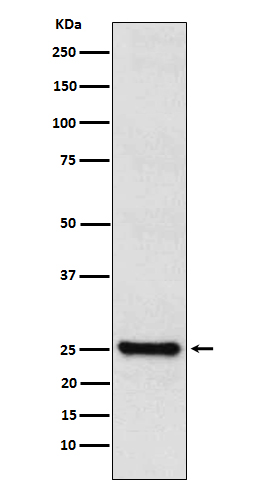Anti-TPPP Rabbit Monoclonal Antibody
- SPECIFICATION
- CITATIONS
- PROTOCOLS
- BACKGROUND

Application
| WB, IHC, IF, ICC, FC |
|---|---|
| Primary Accession | O94811 |
| Host | Rabbit |
| Isotype | IgG |
| Reactivity | Rat, Human, Mouse |
| Clonality | Monoclonal |
| Format | Liquid |
| Description | Anti-TPPP Rabbit Monoclonal Antibody . Tested in WB, IHC, ICC/IF, Flow Cytometry applications. This antibody reacts with Human, Mouse, Rat. |
| Gene ID | 11076 |
|---|---|
| Other Names | Tubulin polymerization-promoting protein, TPPP, 3.6.5.-, 25 kDa brain-specific protein, TPPP/p25, p24, p25-alpha, TPPP {ECO:0000303|PubMed:17105200, ECO:0000312|HGNC:HGNC:24164} |
| Calculated MW | 25 kDa |
| Application Details | WB 1:500-1:2000 IHC 1:50-1:200 ICC/IF 1:50-1:200 FC 1:50 |
| Contents | Rabbit IgG in phosphate buffered saline, pH 7.4, 150mM NaCl, 0.02% sodium azide and 50% glycerol, 0.4-0.5mg/ml BSA. |
| Clone Names | Clone: 21T61 |
| Immunogen | A synthesized peptide derived from human TPPP |
| Purification | Affinity-chromatography |
| Storage | Store at -20°C for one year. For short term storage and frequent use, store at 4°C for up to one month. Avoid repeated freeze-thaw cycles. |
| Name | TPPP {ECO:0000303|PubMed:17105200, ECO:0000312|HGNC:HGNC:24164} |
|---|---|
| Function | Regulator of microtubule dynamics that plays a key role in myelination by promoting elongation of the myelin sheath (PubMed:31522887). Acts as a microtubule nucleation factor in oligodendrocytes: specifically localizes to the postsynaptic Golgi apparatus region, also named Golgi outpost, and promotes microtubule nucleation, an important step for elongation of the myelin sheath (PubMed:31522887, PubMed:33831707). Required for both uniform polarized growth of distal microtubules as well as directing the branching of proximal processes (PubMed:31522887). Shows magnesium-dependent GTPase activity; the role of the GTPase activity is unclear (PubMed:21316364, PubMed:21995432). In addition to microtubule nucleation activity, also involved in microtubule bundling and stabilization of existing microtubules, thereby maintaining the integrity of the microtubule network (PubMed:17105200, PubMed:17693641, PubMed:18028908, PubMed:26289831). Regulates microtubule dynamics by promoting tubulin acetylation: acts by inhibiting the tubulin deacetylase activity of HDAC6 (PubMed:20308065, PubMed:23093407). Also regulates cell migration: phosphorylation by ROCK1 inhibits interaction with HDAC6, resulting in decreased acetylation of tubulin and increased cell motility (PubMed:23093407). Plays a role in cell proliferation by regulating the G1/S-phase transition (PubMed:23355470). Involved in astral microtubule organization and mitotic spindle orientation during early stage of mitosis; this process is regulated by phosphorylation by LIMK2 (PubMed:22328514). |
| Cellular Location | Golgi outpost {ECO:0000250|UniProtKB:D3ZQL7}. Cytoplasm, cytoskeleton, microtubule organizing center {ECO:0000250|UniProtKB:D3ZQL7}. Cytoplasm, cytoskeleton. Nucleus Cytoplasm, cytoskeleton, spindle Note=Specifically localizes to the postsynaptic Golgi apparatus region, also named Golgi outpost, which shapes dendrite morphology by functioning as sites of acentrosomal microtubule nucleation (By similarity). Mainly localizes to the cytoskeleton (PubMed:18028908) Also found in the nucleus; however, nuclear localization is unclear and requires additional evidences (PubMed:18028908). Localizes to glial Lewy bodies in the brains of individuals with synucleinopathies (PubMed:15590652, PubMed:17027006). During mitosis, colocalizes with LIMK2 at the mitotic spindle (PubMed:22328514) {ECO:0000250|UniProtKB:D3ZQL7, ECO:0000269|PubMed:15590652, ECO:0000269|PubMed:17027006, ECO:0000269|PubMed:18028908, ECO:0000269|PubMed:22328514} |
| Tissue Location | Widely expressed.. |

Thousands of laboratories across the world have published research that depended on the performance of antibodies from Abcepta to advance their research. Check out links to articles that cite our products in major peer-reviewed journals, organized by research category.
info@abcepta.com, and receive a free "I Love Antibodies" mug.
Provided below are standard protocols that you may find useful for product applications.
If you have used an Abcepta product and would like to share how it has performed, please click on the "Submit Review" button and provide the requested information. Our staff will examine and post your review and contact you if needed.
If you have any additional inquiries please email technical services at tech@abcepta.com.













 Foundational characteristics of cancer include proliferation, angiogenesis, migration, evasion of apoptosis, and cellular immortality. Find key markers for these cellular processes and antibodies to detect them.
Foundational characteristics of cancer include proliferation, angiogenesis, migration, evasion of apoptosis, and cellular immortality. Find key markers for these cellular processes and antibodies to detect them. The SUMOplot™ Analysis Program predicts and scores sumoylation sites in your protein. SUMOylation is a post-translational modification involved in various cellular processes, such as nuclear-cytosolic transport, transcriptional regulation, apoptosis, protein stability, response to stress, and progression through the cell cycle.
The SUMOplot™ Analysis Program predicts and scores sumoylation sites in your protein. SUMOylation is a post-translational modification involved in various cellular processes, such as nuclear-cytosolic transport, transcriptional regulation, apoptosis, protein stability, response to stress, and progression through the cell cycle. The Autophagy Receptor Motif Plotter predicts and scores autophagy receptor binding sites in your protein. Identifying proteins connected to this pathway is critical to understanding the role of autophagy in physiological as well as pathological processes such as development, differentiation, neurodegenerative diseases, stress, infection, and cancer.
The Autophagy Receptor Motif Plotter predicts and scores autophagy receptor binding sites in your protein. Identifying proteins connected to this pathway is critical to understanding the role of autophagy in physiological as well as pathological processes such as development, differentiation, neurodegenerative diseases, stress, infection, and cancer.


